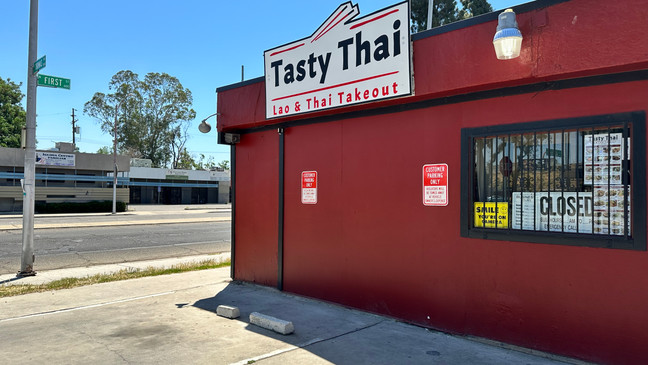States
Racism And Viral Misinformation Lead To The Closure Of Beloved Fresno Tasty Thai Restaurant

Tasty Thai, a beloved Fresno restaurant, was forced to close after a racial reaction sparked by bogus social media charges. After a viral video wrongly accused the eatery of mistreating and eating pets, the family-owned business closed.
The footage of a panting dog tied up outside a home without water sparked uproar online as viewers incorrectly linked it to Tasty Thai. Despite the Fresno Police Department’s quick investigation finding no animal maltreatment in the eatery, the harm was done. Tasty Thai’s Lao owner, David Rasavong, was bombarded with racist remarks and nasty reviews that damaged the restaurant’s image and his family’s mental health.
Rasavong lamented, “We have to close until we get our truth out there so that it doesn’t get any worse,” amid rising hardship.
The event highlights the dangerous nature of internet disinformation and the long-term effects of racial hatred on local businesses and underprivileged groups. Tasty Thai’s story highlights the obstacles ethnic minority businesses confront in entering the American economic world.
After the closure, Fresno residents organized fundraisers and advocacy efforts to fight racial prejudice. The event has raised awareness of the critical need for comprehensive anti-discrimination and educational programs to create a more inclusive and empathic society.
After this tragic chapter, Tasty Thai’s legacy shows immigrant families’ resilience and the necessity for collaborative efforts to protect diversity and equality in the US.
Tasty Thai Restaurant: Racism’s Effect On Local Businesses
Racism persists in many areas of society, including business. It may destroy communities and economies as well as people. The tragic shutdown of Tasty Thai, a renowned Fresno business, shows how viral mob prejudice can cause permanent harm. False charges that the restaurant served dog meat tarnished the owners and sparked a wave of anger and intolerance that prompted the demise of a beloved family business. The tragedy impacted the owners’ livelihood and shook the local community, showing how racial prejudice works.
Read Also: CA/HI NAACP Prioritizes Racism Prevention Laws For Black Communities
Fake Accusations’ Ripple Effect
Baseless, racist claims may have serious repercussions, as seen by Tasty Thai in Fresno. Several occurrences revealed the community’s social fragility after a viral video misrepresented dog abuse. Despite the Fresno Police Department’s rapid investigation and confirmation that no animal maltreatment had occurred, the eatery was swamped with nasty reviews and racist insults. These lies damaged the restaurant’s image and hurt the owners and their families, underscoring the dangers of unrestrained racial intolerance in the internet age.
Culture And Resilience Amid Adversity
Tasty Thai’s painful closure shows the economic effects of racial prejudice and underprivileged populations’ resiliency. The Laotian proprietors have faced cultural preconceptions and discrimination in addition to commercial problems. Their dedication to sharing their cultural history via their restaurant shows how immigrant families persevere to find a place in a new country. The emotional toll on the owners, especially the senior family members, underlines the need for increased social knowledge and empathy to battle the deep-seated biases that continue to plague ethnic minorities in the US.
Community Support And Activism Afterward
After Tasty Thai closed, Fresno residents gathered to support the business owners. Several advocacy organizations and individuals held fundraisers and social media campaigns to highlight how racial discrimination hurts small companies. Community leaders and activists held peaceful protests and awareness campaigns to address structural problems perpetuating negative stereotypes. The combined efforts to create a more inclusive and compassionate atmosphere comforted the afflicted family and spurred significant talks about the need to end racial prejudice.
Business Racial Stigma: Long-term Effects
Beyond Tasty Thai’s closure, the episode raises issues regarding the long-term effects of racial stigmatization on companies, especially ethnic minority-owned ones. The owner’s and their families’ pain mirrors minority businesses’ struggles in competitive marketplaces. Stigmatized cultural stereotypes hinder corporate success and damage disadvantaged populations’ feelings of belonging and cultural pride. The demand for comprehensive anti-discrimination regulations and education campaigns grows, emphasizing the necessity for structural changes that promote corporate inclusion and equality.
Societal Equity And Empathy Lessons
Tasty Thai’s misfortune teaches society the need for empathy, compassion, and cultural sensitivity. The quick spread of disinformation and racially motivated responses highlight the perils of mob mentality and unrestrained biases. The event calls into question how media literacy and digital citizenship might stop toxic narratives that promote racial prejudice. It also urges individual and institutional initiatives to promote respect, admiration, and celebration of varied cultural heritages. Dialogue, education, and advocacy help society create a more fair and compassionate environment that respects the dignity and rights of all people, regardless of culture or race.












You must be logged in to post a comment Login